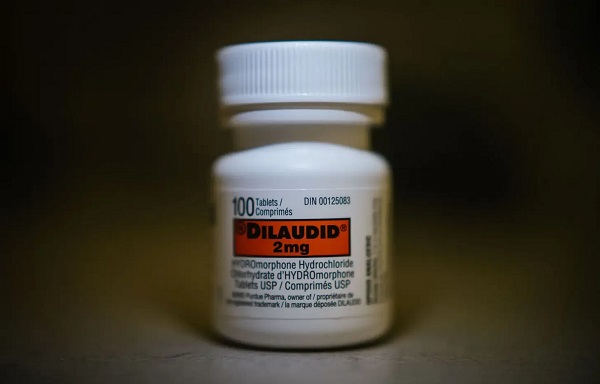Censorship Industrial Complex
Kennedy, CHD win injunction in landmark censorship case against Biden administration

From LifeSiteNews
This article was originally published by The Defender — Children’s Health Defense’s News & Views Website.
The court recognized that the “right of free speech is a fundamental constitutional right that is vital to the freedom of our nation, and the Kennedy plaintiffs have produced evidence of a massive effort by defendants, from the White House to federal agencies, to suppress speech based on its content.”
A federal judge on Wednesday handed Robert F. Kennedy Jr. and Children’s Health Defense (CHD) a partial win in their landmark censorship case alleging the Biden administration colluded with social media platforms to unlawfully censor online content.
Judge Terry A. Doughty of the U.S. District Court for the Western District of Louisiana issued a preliminary injunction prohibiting key Biden administration officials and agencies from coercing or significantly encouraging social media platforms to suppress or censor online content.
However, Judge Doughty simultaneously issued a stay on the injunction until 10 days after the U.S. Supreme Court rules on a similar case, Murthy v. Missouri.
That case, filed in May 2022 by the attorneys general of Missouri and Louisiana and several individual plaintiffs, was originally filed as Missouri v. Biden.
The Supreme Court is set to hear arguments on March 18 on a preliminary injunction in Murthy v. Missouri.
Mary Holland, CHD president, told The Defender that the Valentine’s Day ruling was “a welcome Valentine to the Kennedy plaintiffs,” and “an important victory for the U.S. Constitution.”
She added:
“In a thorough decision, Judge Doughty reasoned that the plaintiffs do have ‘standing’ or the right to sue and be heard; that the defendants have engaged in coercion or significant encouragement to censorship and joint action with social media platforms; and that the court is required to issue the preliminary injunction.
“Further, because it is well-established that violations of free speech rights constitute irreparable injury, the Court acted even before an ultimate decision from the Supreme Court in Murthy v. Missouri. Judge Doughty wrote: ‘This Court … finds the balance of equities and the public interest strongly favors the issue of a preliminary injunction.’
“No doubt the Supreme Court will take account of this ruling as it hears oral arguments in Murthy v. Missouri on March 18.”
Wednesday’s ruling stems from a class-action lawsuit filed in March 2023 by Kennedy, now CHD chairman on leave, CHD and private citizen Connie Sampognaro against President Joe Biden, Dr. Anthony Fauci and other top administration officials and federal agencies.
The suit was filed on behalf of the more than 80% of Americans who access news through social media.
Judge Doughty consolidated Kennedy v. Biden and Murthy v. Biden in July 2023. Both cases were being argued in his court and had the same defendants and many common legal and factual issues.
Although the cases were consolidated, Doughty ruled that the District Court continues to have jurisdiction over Kennedy and CHD’s separate motion for a preliminary injunction, underscoring the fact that a delayed ruling would delay Kennedy from vindicating his claims.
The U.S. Department of Justice did not respond to The Defender’s request for comment.
‘The right of free speech is a fundamental constitutional right’
In his 24-page ruling, Judge Doughty found that several of the defendants in the Kennedy et al. v. Biden lawsuit were violating the plaintiffs’ free speech rights under the First Amendment, causing irreparable harm. He ordered them to cease these violations.
The court recognized that the “right of free speech is a fundamental constitutional right that is vital to the freedom of our nation, and the Kennedy plaintiffs have produced evidence of a massive effort by defendants, from the White House to federal agencies, to suppress speech based on its content.”
Plaintiffs alleged Biden administration officials “waged a systematic, concerted campaign” to compel the nation’s three largest social media companies to censor constitutionally protected speech.
The government, the lawsuit alleges, pressured social media platforms to directly suppress or censor Kennedy and CHD from major platforms and to do the same to content containing views about COVID-19 and other issues that contradicted the government narrative.
Kennedy and CHD argued the court should rule on the preliminary injunction now, because the case is different from Murthy v. Missouri, asks for a more specific injunction and because the defendants singled out Kennedy, who is a U.S. presidential candidate, for censorship.
In determining the merits of the plaintiffs’ motion, Doughty first had to rule on whether the plaintiffs had standing. On that issue, “the court provided strong concrete examples of government coercion or encouragement to censor, particularly with respect to Mr. Kennedy and CHD,” said Kim Mack Rosenberg, CHD general counsel.
Doughty cited evidence that defendants labeled Kennedy as part of the “Disinformation Dozen” who were eventually censored from social media and that some of CHD’s social media posts were also censored.
He also noted that the Centers for Disease Control and Prevention (CDC) worked with the Virality Project to reduce or delete social media posts by people and organizations they believed to be spreading “misinformation” about COVID-19.
The Virality Project explicitly listed Kennedy and CHD in the fifth and second place as the highest performing weekly social-media engagement incidents, he wrote.
“This evidence also was key in the Court’s decision that plaintiffs met all the requirements to support issuing the injunction and that the balance of equities favored plaintiffs here,” Mack Rosenberg added.
Doughty also found the plaintiffs are likely to succeed on the merits of their claim, writing:
“As in Missouri v. Biden, the White House Defendants and the Surgeon General Defendants both coerced and significantly encouraged social-media platforms to suppress protected free speech.
“This Court further finds the CDC Defendants, the CISA [Cybersecurity and Infrastructure Security Agency] Defendants and the FBI Defendants significantly encouraged social-media platforms to suppress protected free speech.”
Defendants ‘likely’ to use their power to suppress alternative views in the future
The defendants have argued that the actions at stake occurred in the past and cannot be remedied by issuing an injunction prohibiting future actions and that there is no “imminent harm” to the defendants because the COVID-19 pandemic and the election where the alleged conduct occurred are in the past.
However, Doughty ruled that the alleged past actions also indicate there is a substantial risk of likely future harm.
“Defendants apparently continue to have meetings with social-media companies and other contacts,” he wrote, adding:
“Although the COVID-19 pandemic is no longer an emergency, it is likely that in the event of any other real or perceived emergency event, the Defendants likely would once again use their power over social-media companies to suppress alternative views.
“And it is certainly likely that Defendants could use their power over millions of people to suppress alternative views or moderate content they do not agree with in the upcoming 2024 national election.”
Although Doughty granted a substantial part of Kennedy et al.’s motion for a preliminary injunction against the White House, the surgeon general, the CDC, FBI and the CISA, he also denied the request for an injunction against several other agencies.
The injunction excluded the U.S. Department of State, the National Institute of Allergy and Infectious Diseases, the U.S. Food and Drug Administration, the U.S. Department of the Treasury, the U.S. Election Assistance Commission, and the U.S. Department of Commerce, who were also included in the plaintiffs’ request.
The Defender on occasion posts content related to Children’s Health Defense’s nonprofit mission that features Mr. Kennedy’s views on the issues CHD and The Defender regularly cover. In keeping with Federal Election Commission rules, this content does not represent an endorsement of Mr. Kennedy who is on leave from CHD and is running for president of the U.S. as an independent candidate.
This article was originally published by The Defender — Children’s Health Defense’s News & Views Website under Creative Commons license CC BY-NC-ND 4.0. Please consider subscribing to The Defender or donating to Children’s Health Defense.
Business
Trump slaps Brazil with tariffs over social media censorship

From LifeSiteNews
By Dan Frieth
In his letter dated July 9, 2025, addressed to President Luiz Inácio Lula da Silva, Trump ties new U.S. trade measures directly to Brazilian censorship.
U.S. President Donald Trump has launched a fierce rebuke of Brazil’s moves to silence American-run social media platforms, particularly Rumble and X.
In his letter dated July 9, 2025, addressed to President Luiz Inácio Lula da Silva, Trump ties new U.S. trade measures directly to Brazilian censorship.
He calls attention to “SECRET and UNLAWFUL Censorship Orders to U.S. Social Media platforms,” pointing out that Brazil’s Supreme Court has been “threatening them with Millions of Dollars in Fines and Eviction from the Brazilian Social Media market.”


Trump warns that these actions are “due in part to Brazil’s insidious attacks on Free Elections, and the fundamental Free Speech Rights of Americans,” and states: “starting on August 1, 2025, we will charge Brazil a Tariff of 50% on any and all Brazilian products sent into the United States, separate from all Sectoral Tariffs.” He also adds that “Goods transshipped to evade this 50% Tariff will be subject to that higher Tariff.”
Brazil’s crackdown has targeted Rumble after it refused to comply with orders to block the account of Allan dos Santos, a Brazilian streamer living in the United States.
On February 21, 2025, Justice Alexandre de Moraes ordered Rumble’s suspension for non‑compliance, saying it failed “to comply with court orders.”
Earlier, from August to October 2024, Moraes had similarly ordered a nationwide block on X.
The court directed ISPs to suspend access and imposed fines after the platform refused to designate a legal representative and remove certain accounts.
Elon Musk responded: “Free speech is the bedrock of democracy and an unelected pseudo‑judge in Brazil is destroying it for political purposes.”
By linking censorship actions, particularly those targeting Rumble and X, to U.S. trade policy, Trump’s letter asserts that Brazil’s judiciary has moved into the arena of foreign policy and economic consequences.
The tariffs, he makes clear, are meant, at least in part, as a response to Brazil’s suppression of American free speech.
Trump’s decision to impose tariffs on Brazil for censoring American platforms may also serve as a clear signal to the European Union, which is advancing similar regulatory efforts under the guise of “disinformation” and “online safety.”
With the EU’s Digital Services Act and proposed “hate speech” legislation expanding government authority over content moderation, American companies face mounting pressure to comply with vague and sweeping takedown demands.
By framing censorship as a violation of U.S. free speech rights and linking it to trade consequences, Trump is effectively warning that any foreign attempt to suppress American voices or platforms could trigger similar economic retaliation.
Reprinted with permission from Reclaim The Net.
Censorship Industrial Complex
Canadian pro-freedom group sounds alarm over Liberal plans to revive internet censorship bill

From LifeSiteNews
The Democracy Fund warned that the Liberal government may bring back a form of Bill C-63, which is aimed at regulating online speech.
One of Canada’s top pro-democracy groups has sounded the alarm by warning that the Canadian federal government is planning to revive a controversial Trudeau-era internet censorship bill that lapsed.
The Democracy Fund (TDF), in a recent press release, warned about plans by the Liberal government under Prime Minister Mark Carney to bring back a form of Bill C-63. The bill, which lapsed when the election was called earlier this year, aimed to regulate online speech, which could mean “mass censorship” of the internet.
“TDF is concerned that the government will try once more to give itself the power to criminalize and punish online speech and debate,” the group said.
“TDF will oppose that.”
According to the TDF, it is “concerned that the government intends to re-introduce the previously abandoned Online Harms Bill in the same or modified form.”
Bill C-63, or the Online Harms Act, was put forth under the guise of protecting children from exploitation online. The bill died earlier this year after former Prime Minister Justin Trudeau called the 2025 federal election.
While protecting children is indeed a duty of the state, the bill included several measures that targeted vaguely defined “hate speech” infractions involving race, gender, and religion, among other categories. The proposal was thus blasted by many legal experts.
The Online Harms Act would have censored legal internet content that the government thought “likely to foment detestation or vilification of an individual or group.” It would be up to the Canadian Human Rights Commission to investigate complaints.
The TDF said that Bill C-63 would have made it a criminal offense to publish ill-defined “harmful content.”
“It required social media companies to remove potentially harmful content or face punitive fines. Many defenders of civil liberty, including TDF, worried that the application of this badly defined concept would lead to mass surveillance and censorship,” the group said.
The TDF warned that under Carney, the government is “once again considering new or similar legislation to regulate online speech, with the Minister of Justice claiming he would take another look at the matter.”
Mark Joseph, TDF litigation director, pointed out that Canada already has laws that “the government can, and does, use to address most of the bad conduct that the Bill ostensibly targeted.”
“To the extent that there are gaps in the Criminal Code, amendments should be carefully drafted to fix this,” he said.
“However, the previous Bill C-63 sought to implement a regime of mass censorship.”
As reported by LifeSiteNews last month, a recent Trudeau-appointed Canadian senator said that he and other “interested senators” want Carney to revive a controversial Trudeau-era internet censorship bill that lapsed.
Another recent Carney government Bill C-2, which looks to ban cash donations over $10,000, was blasted by a constitutional freedom group as a “step towards tyranny.”
Carney, as reported by LifeSiteNews, vowed to continue in Trudeau’s footsteps, promising even more legislation to crack down on lawful internet content.
He has also said his government plans to launch a “new economy” in Canada that will involve “deepening” ties to the world.
Under Carney, the Liberals are expected to continue much of what they did under Justin Trudeau, including the party’s zealous push in favor of abortion, euthanasia, radical gender ideology, internet regulation and so-called “climate change” policies. Indeed, Carney, like Trudeau, seems to have extensive ties to both China and the globalist World Economic Forum, connections that were brought up routinely by conservatives in the lead-up to the election.
-

 Energy2 days ago
Energy2 days agoIs The Carney Government Making Canadian Energy More “Investible”?
-

 Business2 days ago
Business2 days agoDemocracy Watchdog Says PM Carney’s “Ethics Screen” Actually “Hides His Participation” In Conflicted Investments
-

 Business2 days ago
Business2 days agoCompetition Bureau is right—Canada should open up competition in the air
-

 Immigration2 days ago
Immigration2 days agoUnregulated medical procedures? Price Edward Islanders Want Answers After Finding Biomedical Waste From PRC-Linked Monasteries
-

 Business2 days ago
Business2 days agoIt’s Time To End Canada’s Protectionist Supply Management Regime
-

 COVID-192 days ago
COVID-192 days agoFreedom Convoy leaders’ sentencing hearing to begin July 23 with verdict due in August
-

 Addictions2 days ago
Addictions2 days agoAfter eight years, Canada still lacks long-term data on safer supply
-

 National1 day ago
National1 day agoLiberals push to lower voting age to 16 in federal elections





